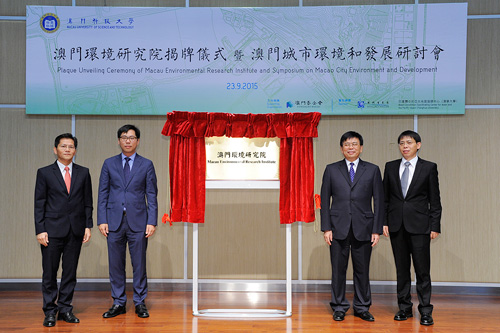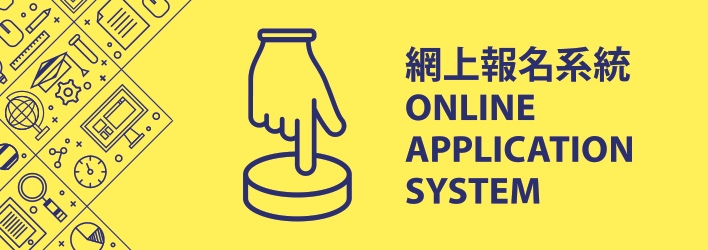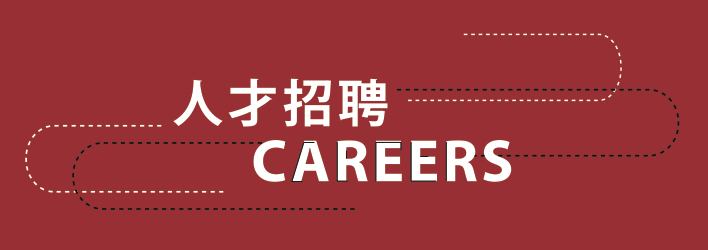
Organized by Macau University of Science and Technology, supported by Macao Foundation, and sponsored by Macao Water Supply Company Limited and the Basel Convention Regional Centre for Asia and the Pacific, Tsinghua University, the “Plaque Unveiling Ceremony of Macau Environmental Research Institute and Symposium on Macao City Environment and Development” was held at N101, MUST at 10 am on September 23, 2015. Mr. Hong Bo, Director of the Youth Division of the Department of Culture and Education, the Liaison Office of the Central People’s Government in the Macao Special Administrative Region, Mr. Li Xiao Quan, Deputy Director General of the Department of Public Diplomacy and Information, Office of the Commissioner of the Ministry of Foreign Affairs of the People’s Republic of China in Macao Special Administrative Region, Mr. Cheang Kun Wai, member of the Administrative Committee of the FDCT, and Chair Prof. Liu Liang, President of MUST hosted the Plaque Unveiling Ceremony of the Macau Environmental Research Institute. At the Ceremony, the University had the honor to invite academician of the Chinese Academy of Engineering, Prof. Hao Ji Ming from School of Environment, Tsinghua University, to give a keynote speech on “China’s Agenda for Control and Prevention of PM2.5”.
When addressing the Ceremony, President Liu Liang noted that as a gaming and tourist destination that’s well known in Asia, or even in the world, Macao has always been a place where the government and the communities give great concerns toward control of city pollution and environmental protection, which has also become a long time research interest of the Macau academics. Such research engagements have also been given great support by both the central government and the Macao SAR government, which therefore makes it possible for scientific researches on city environment and development to achieve continuous advancements in Macau for nearly two decades. Resultantly, such investigations have accumulated a substantial number of research outcomes, which have greatly informed the Macao SAR government in its formulation of relevant policies and regulations, providing both a scientific base and model cases. As such, Macau University of Science and Technology moved to establish the Macau Environmental Research Institute, wishing to further more new systematic studies on Macau’s city environment and development, expand new areas of research, and make new contributions for Macau’s aspiration to become the world center for tourism and leisure and to transform into an energy-saving city. In the mean time, the Institute also has plans to run master and doctoral programs of the relevant fields and foster high quality talents specializing in environmental sciences and management.
Immediately after the Plaque Unveiling Ceremony, the Symposium on Macao City Environment and Development ensued, two concurrent sessions of which were held respectively at N101 and N317 of the Library Building of MUST. At the Symposium, professors, experts, and scholars from well-known environmental research institutes such as Tsinghua University, South China University of Technology, Shenzhen University, and Guangzhou Institute of Geochemistry, Chinese Academy of Sciences, presented their latest research outcomes, including “Numerical simulation of urban air movement and pollution transport with multi-scales”, “VOCs and second air pollution in Pearl river delta region”, “Mitigation and management of urban hazardous wastes”, “Perspective to application of transformation of urban biomass into combustible gases in Macao”, “comprehensive decision making platform based on large data base and internet of things”, “Aerosol distribution and driving forces in Guangdong”, “sludge reduction, reuse and methane generation from urban wastewater treatment”, “POPs and risk assessment in Pearl river estuary”, “Indoor and outdoor air pollution of POPs and healthy risk”, and others.
In hope to contribute ideas and thoughts to Macau’s stride toward becoming the world center of tourism and leisure and the realization of sustainable development, the Symposium has also explored two special topics: “Theories and Methodologies on Assessment of Macao’s City Environmental Impact” and “Materialization of Macao’s City Resources, Energy Conservation, and Reduction of Emission”, which has led to in-depth discussions on the specific contents and topics of more profound cooperation in research, as well as modes of and approaches to interactions between the Macao communities and the departments and offices of the Macao SAR Government.





